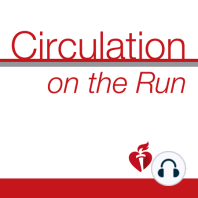16 min listen
Circulation January 31, 2023 Issue
ratings:
Length:
44 minutes
Released:
Jan 31, 2023
Format:
Podcast episode
Description
Please join Guest Host Maryjane Farr, authors Sarah Franklin and Stavros G. Drakos, as well as Associate Editor Hesham Sadek as they discuss the article "Distinct Transcriptomic and Proteomic Profile Specifies Heart Failure Patients With Potential of Myocardial Recovery on Mechanical Unloading and Circulatory Support." Dr. Carolyn Lam: Welcome to Circulation on the Run, your weekly podcast summary and backstage pass to the journal and its editors. We're your cohosts. I'm Dr. Carolyn Lam, associate editor from the National Heart Center in Duke National University of Singapore. Dr. Peder Myhre: And I'm Dr. Peder Myhre, social media editor from Akershus University Hospital and University of Oslo. Dr. Carolyn Lam: Peder, today's featured paper is very, very important in the heart failure world. It is such a deep dive into the transcriptomic and proteomic profile that specifies heart failure and the potential of myocardial recovery with mechanical unloading and circulatory support. Dr. Peder Myhre: Can't wait for that feature discussion today, Carolyn. Dr. Carolyn Lam: But you have to wait because I insist on telling you about yet another really important paper, of course in my favorite subject, heart failure with preserved ejection fraction or HFpEF. Now you know that exercise intolerance is a defining characteristic of HFpEF and a marked rise in pulmonary capillary wedge pressure during exertion is pethepneumonic for HFpEF and it's thought to be a key cause of the exercise intolerance. Now if that is true, acutely lowering the wedge pressure should improve exercise capacity, right? Well, don't assume this because to test this hypothesis, authors led by corresponding author Dr. Ben Levine from UT Southwestern evaluated peak exercise capacity with and without nitroglycerin, which was used to acutely lower pulmonary capillary wedge pressure during exercise in patients with HFpEF. Dr. Peder Myhre: Oh, that's so cool. What an amazing research question and Carolyn, you're the best to summarize this. Please tell us what did they find? Dr. Carolyn Lam: Well, they studied 30 patients with HFpEF and get this. They underwent two bouts of upright seated cycle exercise dosed with sublingual nitroglycerin or a placebo every 15 minutes in a single blind randomized crossover design. So really well done. Wedge pressure, VO2 and cardiac output were assessed at rest with 20 watts exercise and at peak exercise during both the placebo and nitroglycerin conditions and the principle finding of the study (singing) acutely lowering pulmonary capillary wedge pressure during upright exercise with nitroglycerin in HFpEF did not improve peak exercise performance. So peak VO2 was practically identical with a 1% difference despite a 17% drop in peak wedge pressure. Peak cardiac output and peak peripheral oxygen extraction were unchanged, again, despite the drop in peak wedge pressure suggesting that oxygen delivery and utilization were unaffected. Exercise performance variables including peak wattage, peak ventilation and peak RER were unchanged, suggesting that again, reductions in peak wedge were insufficient to improve exercise tolerance. All these results suggest acute reductions in wedge pressure are insufficient to improve exercise capacity and provide convincing evidence that a high wedge during exercise by itself is an epiphenomenon perhaps rather than a primary limiting factor for exercise performance in patients with HFpEF. Now of course this is incredibly interesting contrary to hypothesis and so please read the paper. The discussion is very rich. Dr. Peder Myhre: Oh wow, Carolyn. That is such a great paper. I can't wait to pick it up and read it from start to finish and now Carolyn, we're going to look into research within cardiovascular disease from COVID-19 and we have learned so much and so quickly about COVID-19 and its effects on the heart and we have really come a long way from the first case reports reported in the beginning of the pandemic
Released:
Jan 31, 2023
Format:
Podcast episode
Titles in the series (100)
Circulation August 30, 2016 Issue: Circulation Weekly: Your Weekly Summary & Backstage Pass To The Journal by Circulation on the Run
